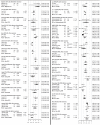Prediction models for patients with esophageal or gastric cancer: A systematic review and meta-analysis
- PMID: 29420636
- PMCID: PMC5805284
- DOI: 10.1371/journal.pone.0192310
Prediction models for patients with esophageal or gastric cancer: A systematic review and meta-analysis
Abstract
Background: Clinical prediction models are increasingly used to predict outcomes such as survival in cancer patients. The aim of this study was threefold. First, to perform a systematic review to identify available clinical prediction models for patients with esophageal and/or gastric cancer. Second, to evaluate sources of bias in the included studies. Third, to investigate the predictive performance of the prediction models using meta-analysis.
Methods: MEDLINE, EMBASE, PsycINFO, CINAHL, and The Cochrane Library were searched for publications from the year 2000 onwards. Studies describing models predicting survival, adverse events and/or health-related quality of life (HRQoL) for esophageal or gastric cancer patients were included. Potential sources of bias were assessed and a meta-analysis, pooled per prediction model, was performed on the discriminative abilities (c-indices).
Results: A total of 61 studies were included (45 development and 16 validation studies), describing 47 prediction models. Most models predicted survival after a curative resection. Nearly 75% of the studies exhibited bias in at least 3 areas and model calibration was rarely reported. The meta-analysis showed that the averaged c-index of the models is fair (0.75) and ranges from 0.65 to 0.85.
Conclusion: Most available prediction models only focus on survival after a curative resection, which is only relevant to a limited patient population. Few models predicted adverse events after resection, and none focused on patient's HRQoL, despite its relevance. Generally, the quality of reporting is poor and external model validation is limited. We conclude that there is a need for prediction models that better meet patients' information needs, and provide information on both the benefits and harms of the various treatment options in terms of survival, adverse events and HRQoL.
Conflict of interest statement
Figures



References
-
- Ferlay J, Soerjomataram I, Ervik M, Dikshit R, Eser S, Mathers C, et al. GLOBOCAN 2012 v1.0, Cancer Incidence and Mortality Worldwide: IARC CancerBase No. 11 [Internet]. Lyon, France: International Agency for Research on Cancer, 2013.
-
- Nashimoto A, Akazawa K, Isobe Y, Miyashiro I, Katai H, Kodera Y, et al. Gastric cancer treated in 2002 in Japan: 2009 annual report of the JGCA nationwide registry. Gastric Cancer. 2013;16(1):1–27. Epub 06/26. doi: 10.1007/s10120-012-0163-4 Epub 2012 Jun 23. - DOI - PMC - PubMed
-
- Reim D, Loos M, Vogl F, Novotny A, Schuster T, Langer R, et al. Prognostic implications of the seventh edition of the international union against cancer classification for patients with gastric cancer: the Western experience of patients treated in a single-center European institution. Journal of Clinical Oncology. 2013;31(2):263–71. https://dx.doi.org/10.1200/JCO.2012.44.4315. - DOI - PubMed
-
- Surveillance, Epidemiology, and End Results Program: National Cancer Institute; 2013 [cited 2017 30-05-2017]. https://seer.cancer.gov/statfacts/.
-
- Jacobs M, Macefield RC, Elbers RG, Sitnikova K, Korfage IJ, Smets EM, et al. Meta-analysis shows clinically relevant and long-lasting deterioration in health-related quality of life after esophageal cancer surgery. Quality of life research: an international journal of quality of life aspects of treatment, care and rehabilitation. 2014;23(4):1097–115. Epub 2013/10/17. doi: 10.1007/s11136-013-0545-z . - DOI - PubMed
Publication types
MeSH terms
LinkOut - more resources
Full Text Sources
Other Literature Sources
Medical

